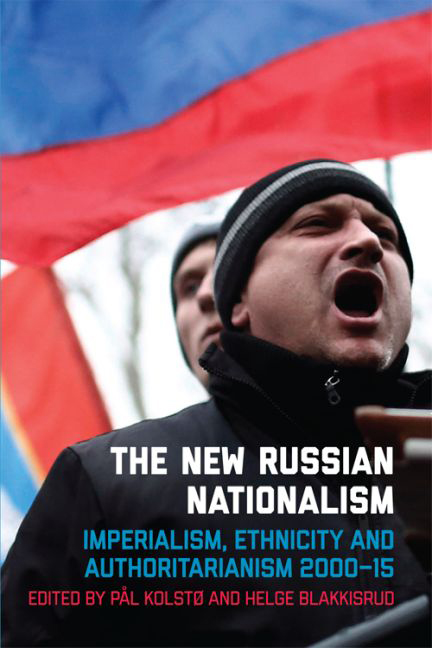Book contents
- Frontmatter
- Contents
- List of Figures
- List of Tables
- Acknowledgements
- Notes on Contributors
- Introduction: Russian nationalism is back – but precisely what does that mean?
- 1 The ethnification of Russian nationalism
- 2 The imperial syndrome and its influence on Russian nationalism
- 3 Radical nationalists from the start of Medvedev's presidency to the war in Donbas: True till death?
- 4 Russian ethnic nationalism and religion today
- 5 Everyday nationalism in Russia in European context: Moscow residents’ perceptions of ethnic minority migrants and migration
- 6 Backing the USSR 2.0: Russia's ethnic minorities and expansionist ethnic Russian nationalism
- 7 Rallying ’round the leader more than the flag: Changes in Russian nationalist public opinion 2013–14
- 8 How nationalism and machine politics mix in Russia
- 9 Blurring the boundary between civic and ethnic: The Kremlin's new approach to national identity under Putin's third term
- 10 Russia as an anti-liberal European civilisation
- 11 Ethnicity and nationhood on Russian state-aligned television: Contextualising geopolitical crisis
- 12 The place of economics in Russian national identity debates
- Bibliography
- Index
3 - Radical nationalists from the start of Medvedev's presidency to the war in Donbas: True till death?
- Frontmatter
- Contents
- List of Figures
- List of Tables
- Acknowledgements
- Notes on Contributors
- Introduction: Russian nationalism is back – but precisely what does that mean?
- 1 The ethnification of Russian nationalism
- 2 The imperial syndrome and its influence on Russian nationalism
- 3 Radical nationalists from the start of Medvedev's presidency to the war in Donbas: True till death?
- 4 Russian ethnic nationalism and religion today
- 5 Everyday nationalism in Russia in European context: Moscow residents’ perceptions of ethnic minority migrants and migration
- 6 Backing the USSR 2.0: Russia's ethnic minorities and expansionist ethnic Russian nationalism
- 7 Rallying ’round the leader more than the flag: Changes in Russian nationalist public opinion 2013–14
- 8 How nationalism and machine politics mix in Russia
- 9 Blurring the boundary between civic and ethnic: The Kremlin's new approach to national identity under Putin's third term
- 10 Russia as an anti-liberal European civilisation
- 11 Ethnicity and nationhood on Russian state-aligned television: Contextualising geopolitical crisis
- 12 The place of economics in Russian national identity debates
- Bibliography
- Index
Summary
This chapter examines the evolution of the radical wing in Russian nationalism, from the early days of Dmitrii Medvedev's presidency in 2008 to the war in the Donbas region that started in 2014. ‘Russian nationalism’ is an extremely broad concept (see Laruelle 2009a); there is no such thing as one unified movement of Russian nationalists. However, in the context of an authoritarian regime and the general weakness of political movements, we may note one important distinguishing criterion: relations with the authorities. This enables us, for the purposes of discussion, to separate those nationalists who oppose the authorities from those who support them. This chapter deals only with the opposition sector, so organisations like Motherland (Rodina) and the People's Assembly (Narodnyi Sobor) are not examined here.
The opposition sector is also diverse. Here I will focus on those groups and organisations that are characteristic of it, which means excluding from the analysis those currents that, while undoubtedly interesting, are not typical. First, I will not be examining groups and organisations representing the ‘old nationalism’ of the 1990s, because these groups are becoming steadily less active and do not play any special role in the movement as a whole. Second, I will not be considering those groups that are primarily Stalinist, and nationalist only as a secondary consideration, like the followers of Colonel Vladimir Kvachkov. Eduard Limonov's followers also clearly keep themselves apart from the nationalist movement. Third, I exclude from the analysis here all national democratic currents – not because they are not part of the nationalist movement (they are), but because they differ significantly from the main sector and are notably fewer in number (in terms of various numerical indicators). National democrats clearly have their own, emergent path, and it would be a mistake to examine their dynamics and potential together with the rest.
- Type
- Chapter
- Information
- The New Russian NationalismImperialism, Ethnicity and Authoritarianism 2000–2015, pp. 75 - 103Publisher: Edinburgh University PressPrint publication year: 2016



